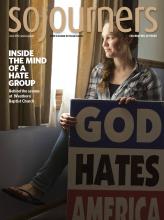DISNEY ANIMATION is often criticized for masking cynical corporate values—Wall-E’s profound challenge to over-consumption was accompanied by the selling of toys and games; the company claims to be pro-feminist but only tweaks the fairytale princess archetype with heroines who express their “strength” by showing that they can fight like a man.
Yet there’s still some magic in the Disneymagination—Fantasia, The Jungle Book, and The Lion King, despite their political alarm bells (racism and homophobia are challenged and reinforced, the average of which can only compute to ambivalence), are examples of visual resplendence, a sense of humor, and an invitation to hope. The best parts of the Disney worldview look like the eschatological images in a Martin Luther King Jr. speech; the worst merely bolster a culture of privilege and exclusion.
The most Disney-like current film is Mirror, Mirror, a retelling of the Snow White story, directed by the fantastic visual stylist Tarsem Singh. It features Julia Roberts in a wickedly entertaining turn as the queen, with a witty script, gorgeous set and costume design, and some bawdy fun. But the portrayal of Snow White as a “liberated” young woman whose liberation depends on her behaving like a Bruce Willis action character produces a paradox: Any of the images from this film could be exhibited in an art gallery—so elegantly composed and imaginative are they—but the ethical heart of the film isn’t artful at all.
Read the Full Article
